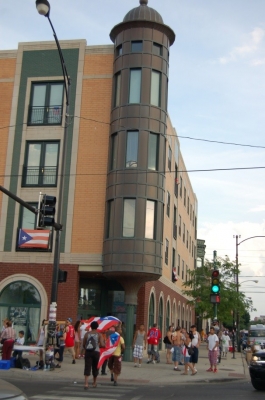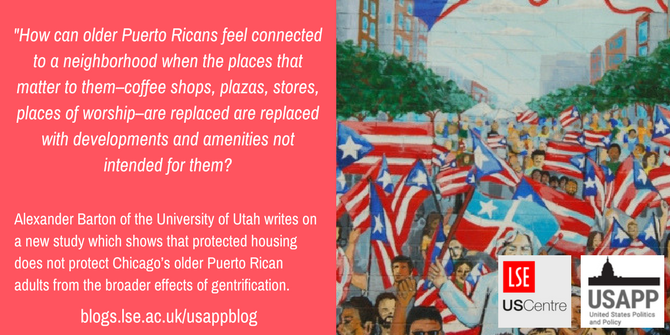 Gentrification is a much talked about topic among academics and urban planners alike, with a great deal of the discussion focusing on its effects on minority communities. But how does gentrification affect older members of such communities? Alexander Barton profiles a new study by Ivis García and Mérida M. Rúa which examines the impact of gentrification in Chicago on older Puerto Ricans. They find that as residents of protected housing, members of this community have relative housing security, but are being indirectly displaced by the socioeconomic, cultural, and physical changes that are happening to where they have lived for decades.
Gentrification is a much talked about topic among academics and urban planners alike, with a great deal of the discussion focusing on its effects on minority communities. But how does gentrification affect older members of such communities? Alexander Barton profiles a new study by Ivis García and Mérida M. Rúa which examines the impact of gentrification in Chicago on older Puerto Ricans. They find that as residents of protected housing, members of this community have relative housing security, but are being indirectly displaced by the socioeconomic, cultural, and physical changes that are happening to where they have lived for decades.
“Why do you want to know about us?” an elderly Puerto Rican woman asked on a late September afternoon at Reverend Alvarez Senior Apartments. Her question, addressed to a researcher studying the lives of older Latinas and Latinos in Chicago, revealed a deep-rooted cynicism about changes happening in the Logan Square neighborhood. “What good would it do?” she continued. “All the changes here have been for the gringos, not for us. We are here, nothing more.”
These remarks, and countless more just like them, convinced two researchers that more needs to be done to address the effects of gentrification on older minority populations. Gentrification is a hot topic among scholars, but most researchers gloss over its impact on older adults. In new research which makes use of demographic and qualitative data, Ivis García and Mérida M. Rúa unpack complicated feelings and ideas about the forces behind neighborhood change.
 They find that displacement threatens even those who live in protected housing, such as subsidized low-income apartments for seniors. When discussing gentrification, most think of displacement as occurring through direct means: escalating rents, an increase in property tax, or the upgrade of a modest unit to luxury housing. Few consider the implications of indirect displacement, though these forces are just as potent in the lives of older adults. Indirect displacement refers to broad socioeconomic, cultural, and physical changes, such as the disappearance of local services, shops, and meeting places. Residents may be able to afford their housing, but they no longer feel connected to the neighborhoods where they have raised families or grown older.
They find that displacement threatens even those who live in protected housing, such as subsidized low-income apartments for seniors. When discussing gentrification, most think of displacement as occurring through direct means: escalating rents, an increase in property tax, or the upgrade of a modest unit to luxury housing. Few consider the implications of indirect displacement, though these forces are just as potent in the lives of older adults. Indirect displacement refers to broad socioeconomic, cultural, and physical changes, such as the disappearance of local services, shops, and meeting places. Residents may be able to afford their housing, but they no longer feel connected to the neighborhoods where they have raised families or grown older.
The problem is the result (displacement), not the cause (neighborhood change). Through direct or indirect means, Puerto Ricans as long-term residents of Logan Square, Humboldt Park, and West Town are being pushed out in droves. In 1970, more than 60 per cent of all Puerto Ricans in Chicago lived in these three neighborhoods. Today, only 30 per cent of the city’s Puerto Ricans live in these areas. Gentrification proves to be a vicious cycle. Development, neighborhood amenities, and other services are created with financially secure newcomers in mind, replacing affordable grocery stores, clothing shops, and healthcare services with trendy restaurants, boutiques, and upscale chain stores. Residents fight to protect their sense of place, but it is often a losing game.
Aging in place is more than the four walls of an apartment, and gentrification is about more than obliterating affordable housing. How can older adults, in this case, older Puerto Ricans, feel connected to a neighborhood when the places that matter to them–coffee shops, plazas, stores, places of worship–are replaced are replaced with developments and amenities not intended for them? “It’s for the yuppies,” one resident of Reverend Alvarez complained when she reviewed plans for a new development project in the neighborhood. “I prefer to shop where la gente [the common people] buy their food.” Another resident said, “It gave me such sorrow and pain to know that none of that is for us. Puerto Ricans are always pushed out.” Many older adults live in nonprofit-sponsored affordable housing. With the changing neighborhood and demographics, there are concerns that places like Reverend Alvarez and Teresa Roldan Apartments will relocate to resource- and amenity-poor neighborhoods.

Nonprofit organizations like the Hispanic Housing Development Corporation are working to fill the gap between market-rates and low-income housing for senior populations. The median annual retirement income for Puerto Ricans in Chicago is $15,227. The median annual Social Security payment is $11,864. For housing to be considered affordable (30 per cent of one’s income), seniors would need to pay about $420 a month for an apartment. But median gross rent is more than twice that amount, $885 a month. Puerto Ricans are more likely than other older Latinos to live alone, but this possible housing preference is difficult with escalating rents.
Ultimately, coordination between housing nonprofits, neighborhood councils, developers, and elected officials is needed to ensure long-time residents of a community have their needs met. “We have the apartments, thank God, but there are many other things that we need,” one resident of Reverend Alvarez said. “Our interests matter.” García and Rúa conclude that providing affordable housing should not be the endgame. More than keeping people from being displaced, there must be a concerted effort to keep people from feeling displaced. “Each neighborhood,” they write, “must consistently and intentionally evaluate its challenges and opportunities to develop a strategy where residents at every life stage can enjoy a high quality of life.”
- This article is based on the paper, “Our interests matter: Puerto Rican older adults in the age of gentrification” in Urban Studies.
Please read our comments policy before commenting.
Note: This article gives the views of the author, and not the position of USAPP – American Politics and Policy, nor the London School of Economics.
Shortened URL for this post: http://bit.ly/2Hlf1qT
_________________________________
About the author
 Alexander Barton – University of Utah
Alexander Barton – University of Utah
Alexander Barton is a master’s student in the Department of City and Metropolitan Planning at the University of Utah. He received a bachelor of geography degree from Brigham Young University, with an emphasis in urban and regional planning and a minor in psychology.







1 Comments